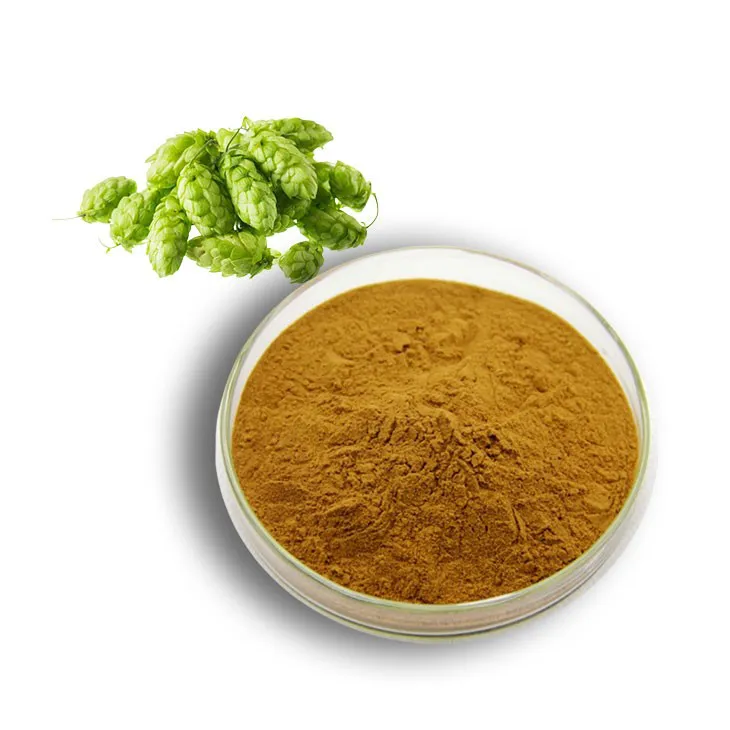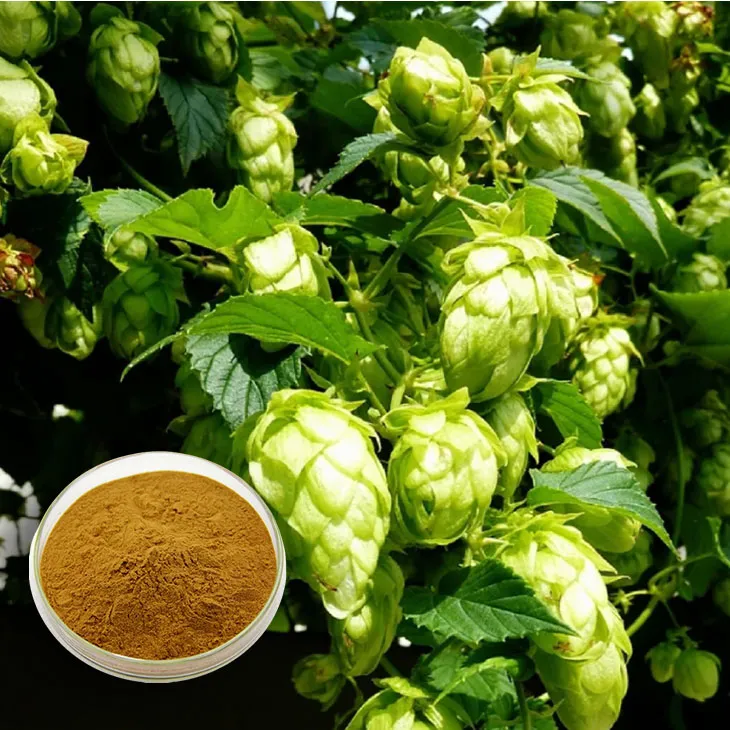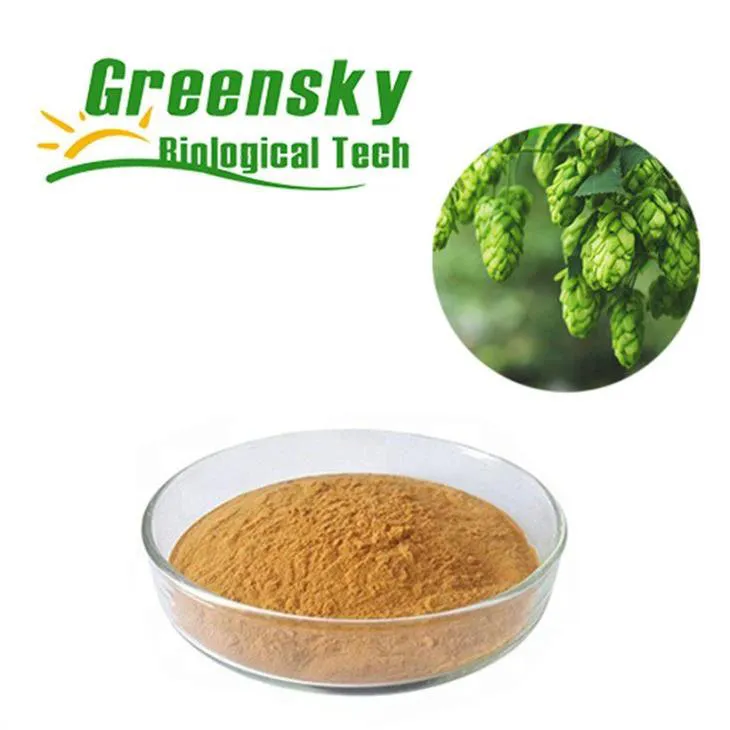- 0086-571-85302990
- sales@greenskybio.com
How do hops extract manufacturers wholesale and customize products?
2024-12-10

1. Introduction
Beer hop extract manufacturers operate in a dynamic market where both wholesale and product customization play crucial roles. In the world of brewing, hop extracts have become an essential ingredient, offering consistency and convenience compared to traditional whole hops. This article will explore how manufacturers can effectively wholesale and customize their hop extract products.

2. Wholesale of Hop Extracts
2.1 Product Range
A diverse product range is a significant advantage in the wholesale market for hop extract manufacturers. Different forms of hop extracts are available, each with its own characteristics and applications.
-
Liquid hop extracts are popular for their ease of use in brewing systems. They can be easily incorporated into the brewing process, allowing for precise dosing. Brewers often prefer liquid extracts for their flexibility in creating different flavor profiles.
-
Powdered hop extracts are another option. They have a longer shelf - life compared to liquid forms and are more convenient for transportation and storage. Powdered extracts can be reconstituted easily during the brewing process.
-
Pelletized hop extracts are widely used in the brewing industry. They are highly concentrated and offer a consistent release of flavors and aromas during brewing. Pellets are also less likely to clog brewing equipment.
By offering all these forms, manufacturers can attract a wider customer base. Different breweries may have different preferences based on their brewing equipment, production scale, and target beer styles. For example, small - scale craft breweries might prefer liquid extracts for their artisanal brewing processes, while large - scale commercial breweries may opt for pelletized extracts for their high - volume production lines.
2.2 Cost Structure and Pricing
Understanding the cost structure is essential for setting appropriate wholesale prices. There are several components that contribute to the overall cost of hop extract production.
-
Raw material costs are a significant factor. The quality and availability of hops can vary, depending on factors such as the growing region, harvest season, and hop variety. Manufacturers need to source high - quality hops to produce top - notch extracts, and this can impact the cost. For example, some rare or specialty hop varieties may be more expensive to acquire, but they can also command a higher price in the market due to their unique flavor profiles.
-
Production costs include expenses related to processing the hops into extracts. This involves equipment, labor, and energy costs. High - tech extraction methods may yield better - quality extracts but can also be more expensive to operate. Manufacturers need to balance the cost - effectiveness of their production processes while maintaining product quality.
-
Transportation costs also play a role in the cost structure. Depending on the location of the manufacturing facility and the customers, transportation expenses can vary. Heavier or bulkier forms of hop extracts, such as liquid extracts in large containers, may incur higher transportation costs. Manufacturers may need to consider optimizing their packaging and shipping methods to reduce these costs.
Once the cost structure is clearly understood, manufacturers can set reasonable wholesale prices. Pricing too high may drive away customers, while pricing too low may result in unprofitability. Market research can help determine the price sensitivity of customers and the competitive landscape. Manufacturers can also consider offering different price tiers based on the volume of wholesale purchases, with larger orders receiving a more favorable per - unit price.

3. Product Customization
3.1 Adapting to Emerging Trends
In the world of beer brewing, emerging trends are constantly shaping the demand for hop extracts. One significant trend is the increasing popularity of low - alcohol and non - alcoholic beers.
For these types of beers, the traditional role of hops in providing bitterness needs to be re - evaluated. Manufacturers need to develop hop extracts that can contribute the desired flavor and aroma without adding excessive bitterness. This requires a deep understanding of the chemical components of hops and how they interact during the brewing process.
For example, certain hop compounds are responsible for bitterness, while others contribute to flavor and aroma. By selectively extracting and concentrating these different components, manufacturers can create hop extracts tailored to the needs of low - alcohol and non - alcoholic beer production.
Another aspect of customization is related to the terpene profile of the hop extract. Terpenes are compounds that significantly affect the aroma of the beer. Different hop varieties have distinct terpene profiles, and manufacturers can manipulate these profiles to create unique aromas.
For instance, some breweries may be looking for a citrusy aroma in their beers, while others may prefer a more floral or herbal note. Manufacturers can customize the terpene content of their extracts to meet these specific requirements. This may involve using specific hop varieties, adjusting the extraction process, or even blending different extracts to achieve the desired aroma profile.
3.2 Meeting Specific Brewer Requirements
In addition to following trends, hop extract manufacturers also need to be able to meet the specific requirements of individual breweries. Each brewery has its own unique brewing philosophy, target market, and brand identity.
Some breweries may be focused on creating traditional - style beers and may require hop extracts that can replicate the flavor profiles of classic hop varieties. Others may be more experimental and looking for extracts that can bring out novel flavors and aromas.
To meet these diverse needs, manufacturers need to have a flexible production process. This may include offering custom - blended extracts, where different hop varieties are combined in specific ratios according to the brewer's request. It could also involve adjusting the extraction parameters, such as temperature, pressure, or extraction time, to achieve the desired characteristics in the final product.
Communication with the brewers is also crucial. Manufacturers should have a team of experts who can understand the brewers' needs and translate them into actionable production plans. This may involve regular meetings, product sampling, and feedback loops to ensure that the customized hop extracts meet the expectations of the brewers.

4. Marketing for Wholesale and Customization
4.1 Industry Trade Shows
Industry trade shows are an excellent platform for hop extract manufacturers to promote their wholesale and customization services. These events bring together breweries, distributors, and other industry professionals from around the world.
At trade shows, manufacturers can showcase their product range, including different forms of hop extracts and their customization capabilities. They can set up booths with product displays, samples, and technical information. This allows potential customers to see, taste, and learn about the products firsthand.
For example, a manufacturer can demonstrate how their liquid hop extracts can be used in a small - scale brewing setup at a craft brewery booth. They can also show samples of customized extracts with unique aroma profiles that were developed for specific breweries.
Trade shows also provide an opportunity for manufacturers to network with potential partners. They can meet with distributors who can help expand their wholesale business, or they can collaborate with other industry players on research and development projects related to product customization.
4.2 Technical Papers and Publications
Publishing technical papers on their products and processes is another effective marketing strategy for hop extract manufacturers. These papers can be published in industry - related journals or presented at scientific conferences.
Technical papers can detail the research and development behind the hop extracts, such as the extraction methods used, the quality control measures in place, and the benefits of using their products. For example, a paper could explain how a manufacturer's new extraction technique results in a more pure and stable hop extract, with improved flavor and aroma characteristics.
By sharing this technical knowledge, manufacturers can position themselves as industry leaders and gain the trust of potential customers. Breweries are more likely to choose a manufacturer whose products are backed by scientific research and transparency in production processes.
4.3 Digital Marketing Channels
In today's digital age, digital marketing channels are essential for reaching out to a wide audience. Manufacturers can use their website to showcase their product range, customization options, and customer testimonials.
Social media platforms can also be used effectively. For example, on Instagram, manufacturers can post pictures and videos of their hop extracts in use during the brewing process, or they can share stories about the development of new customized products. Twitter can be used to engage in conversations with breweries, industry experts, and consumers, sharing the latest news and updates about their products.
Email marketing is another tool. Manufacturers can send regular newsletters to their existing and potential customers, highlighting new product launches, special offers for wholesale purchases, and case studies of successful customization projects.
5. Conclusion
Hop extract manufacturers face both challenges and opportunities in wholesale and product customization. By offering a diverse product range, understanding cost structures for appropriate pricing, adapting to emerging trends and specific brewer requirements in customization, and implementing effective marketing strategies, they can succeed in this competitive market. The ability to balance these aspects will determine their long - term viability and growth in the beer hop extract industry.
FAQ:
What are the key factors for hop extract manufacturers to set reasonable wholesale prices?
The key factors for hop extract manufacturers to set reasonable wholesale prices include having a clear understanding of the cost structure. This involves considering raw material costs, production costs, and transportation costs. By accurately accounting for these elements, manufacturers can determine a price that is both competitive and profitable in the wholesale market.
How can hop extract manufacturers attract more wholesale customers?
Manufacturers can attract more wholesale customers by offering a wide product range. This means providing different forms of hop extracts such as liquid, powder, or pellet forms. A diverse product line gives customers more options to choose from based on their specific needs, thus increasing the likelihood of attracting a broader customer base.
Why is the ability to adapt to emerging trends important in hop extract customization?
The ability to adapt to emerging trends is important in hop extract customization because the beer market is constantly evolving. For example, with the growing popularity of low - alcohol and non - alcoholic beers, the demand for hop extracts that can provide flavor and aroma without excessive bitterness has increased. Adapting to such trends allows manufacturers to meet the changing needs of the market and stay competitive in the customization aspect.
What role does the terpene profile play in hop extract customization?
The terpene profile plays a significant role in hop extract customization as it greatly affects the aroma. Manufacturers can offer customization in terms of the terpene profile to create hop extracts with different and unique aromas, which can be tailored to the specific requirements of different beer producers or for creating new and distinct beer flavors.
How can hop extract manufacturers effectively market their products for both wholesale and customization?
For effective marketing in both wholesale and customization, manufacturers can participate in industry trade shows. This provides an opportunity to showcase their products directly to potential customers and partners. Publishing technical papers on their products and processes can also enhance their credibility and visibility in the industry. Additionally, using digital marketing channels helps reach a wider audience, allowing them to connect with more potential customers and partners.
Related literature
- The Role of Hops in Brewing: A Comprehensive Review"
- "Advances in Hop Extract Manufacturing for the Brewing Industry"
- "Customization in the Hop Extract Market: Meeting the Demands of Modern Brewing"
- ▶ Hesperidin
- ▶ Citrus Bioflavonoids
- ▶ Plant Extract
- ▶ lycopene
- ▶ Diosmin
- ▶ Grape seed extract
- ▶ Sea buckthorn Juice Powder
- ▶ Fruit Juice Powder
- ▶ Hops Extract
- ▶ Artichoke Extract
- ▶ Mushroom extract
- ▶ Astaxanthin
- ▶ Green Tea Extract
- ▶ Curcumin
- ▶ Horse Chestnut Extract
- ▶ Other Product
- ▶ Boswellia Serrata Extract
- ▶ Resveratrol
- ▶ Marigold Extract
- ▶ Grape Leaf Extract
- ▶ New Product
- ▶ Aminolevulinic acid
- ▶ Cranberry Extract
- ▶ Red Yeast Rice
- ▶ Red Wine Extract
-
Elderberry Extract
2024-12-10
-
Panax Ginseng Leaf Extract
2024-12-10
-
Yohimbine Bark Extract
2024-12-10
-
Saw Palmetto Extract
2024-12-10
-
Lemon Juice Powder
2024-12-10
-
Marigold Extract
2024-12-10
-
Peppermint Oil
2024-12-10
-
White Willow Bark Extract
2024-12-10
-
Lily extract
2024-12-10
-
Artichoke Extract
2024-12-10





















